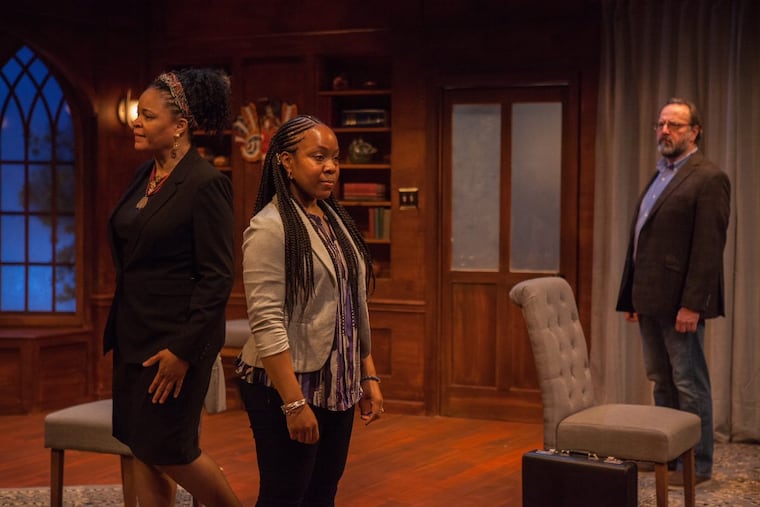'Human Rites' at InterAct Theatre: Invigorating, crackling, provocative
Seth Rozin's "Human Rites" addresses provocative issues with crackling dialogue, believable characters, and persuasive arguments on all sides. At issue are genital mutilation, academic freedom, assisted living, and much more.

When Westerners decry the practices of other cultures, and campaign for change, they may mean well. But are they really spreading enlightenment, or shame? Who gets to decide whether an initiation rite is barbaric or an exemplary form of bonding? Are there any cultural absolutes, or are all cultural norms equally valid?
This constellation of questions animates Seth Rozin's crafty and invigorating one-act play, Human Rites, the third production of InterAct Theatre Company's 30th anniversary season.
Rozin, the company's producing artistic director, has wed crackling dialogue with provocative ideas and believable characters. And Human Rites gets the Philadelphia premiere it deserves, with Barrymore Award winner Harriet Power directing a trio of stellar actors: Kimberly S. Fairbanks, Barrymore Award winner Joe Guzmán, and Barrymore Award nominee Lynnette R. Freeman.
Inspired, in part, by the life and research of anthropologist Fuambai Sia Ahmadu and a controversial paper by University of Chicago cultural psychologist Richard Shweder, Human Rites is not for the squeamish. Rozin's case study for examining clashing cultural perspectives is the practice variously referred to as female circumcision or female genital mutilation (the more loaded term). As one might expect, male circumcision also finds itself in the crosshairs, along with abortion, slavery, and assisted living.
The action begins with a bearded, middle-aged man in standard academic garb – a jacket over jeans – waiting nervously in a well-appointed office, ornamented by a colorful cobra mask, statuary, and ceramics that speak to its occupant's cosmopolitan interests and travels. (Colin McIlvaine is the scenic designer; Lizzy Pecora did the costumes.)
Professor Alan Friedman (Guzmán), a Jewish cultural psychologist, has been summoned by his university's dean of arts and sciences, Michaela Richards (Fairbanks), an African American woman with whom he years ago had a torrid adulterous affair. A nice frisson of tension, sexual and otherwise, pervades their interactions.
Friedman has just presented his sophomore seminar with the surprising results of a study he and two female interviewers conducted: In four African countries, most women reported positive feelings about female circumcision. Friedman's students have conveyed their shock and horror to the dean, who happens to have an adopted daughter from Mali.
"Your paper offends me," she tells her indignant ex. He predictably enough cites academic freedom, defends his methods, and notes that he, too, had been prepared to find the practice "barbaric, humiliating, dangerous and disempowering" – until the women in his study overwhelmingly disagreed.
The third character – anthropology grad student Lydia Namandu, from Sierra Leone – enters the scene as a tiebreaker. Initially deferential, she becomes a powerful voice in favor of a woman's right to choose – in this case, tradition, community, and, yes, circumcision. Freeman is mesmerizing in the role.
Rozin gives all three of his characters strong, persuasive arguments. No one here is a villain, although Fairbanks' dean does stumble into self-righteousness. You may remain skeptical – I am –of the notion that cultural practices can't be fairly judged by outsiders. But you will likely leave the theater engaged in the debate.
A free symposium from 4 to 6 p.m. Saturday, "The Lives of Others: A conversation about the parallel pursuits of playwriting and anthropology," will feature Rozin, Shweder, Ahmadu, and other panelists.